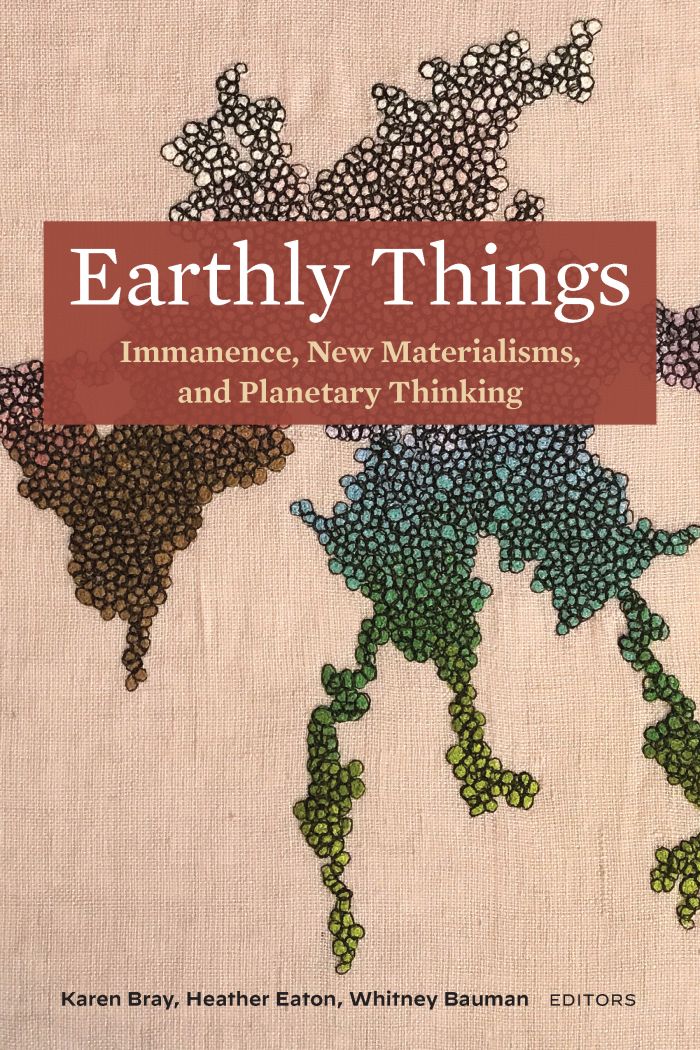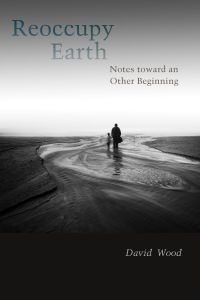Earthly Things
Immanence, New Materialisms, and Planetary Thinking

This book can be opened with

Globalization and climate weirding are two of the leading phenomena that challenge and change the way we need to think and act within the planetary community. Modern Western understandings of human beings, animals, and the rest of the natural world and the subsequent technologies built on those understandings have thrown us into an array of social and ecological crises with planetary implications. Earthly Things: Immanence, New Materialisms, and Planetary Thinking, argues that more immanent or planetary ways of thinking and acting have great potential for re-thinking human-technology-animal-Earth relationships and for addressing problems of global climate weirding and other forms of ecological degradation. Older and often-marginalized forms of thought from animisms, shamanisms, and other religious traditions are joined by more recent forms of thinking with immanence such as the universe story, process thought, emergence theory, the new materialisms (NM’s), object-oriented ontologies (OOO’s), affect theory, and queer theory.
This book maps out some of the connections and differences between immanent frameworks to provide some eco-intellectual commons for thinking within the planetary community, with a particular emphasis on making connections between more recent theories and older ideas of immanence found in many of the world’s religious traditions. The authors in this volume met and worked together over five years, so the resulting volume reveals sustained and multifaceted perspectives on “thinking and acting with the planet.”
Way to bring religion down to Earth! Humankind needs to get its act together, but we aren’t feeling it yet. Every essay in this book reframes ecological speech in the key of religious uplift, an affect that can achieve Earth magnitude. But wait, there’s more. I hold that religion is the phenomenology of the biosphere: how it is lived. Religion is too often essentialized and naturalized and displaced and kicked upstairs into a heaven where a mostly white mostly male cis psychopath who mostly wants to hurt you needs protection money. This wonderful book is part of making sure that can’t happen.—Timothy Morton, author of Humankind: Solidarity with Nonhuman People
The humanities have witnessed an invigorating influx of new (or, perhaps, old) modes of immanent thought. These new/old varieties of vitalism, materialism, and animism challenge transcendent, dualistic perspectives that reduce matter to inert, lifeless stuff and locate supreme value in realms beyond our earthly home. Earthly Things presents a persuasive genealogy of these intriguing “isms,” effectively interweaving them with emerging scholarship in religion and ecology. The essays issue a delightfully varied but cohesive call for planetary sensibilities—immanent religiosities—that bind humans to our nonhuman kin and ground us once more in the living earth.—Lisa H. Sideris, Professor of Environmental Studies, University of California, Santa Barbara
Earthly Things is brimming with fruitful insights, generative extensions, and stimulating rapprochements. I hope it finds curious and open-minded audiences invested in religious studies, science and technology studies, philosophy, and the environmental humanities.—H-Net Reviews
Karen Bray is Associate Professor of Religion, Philosophy, and Social Change and Director of the Honors Program at Wesleyan College. Her recent publications include Grave Attending: A Political Theology for the Unredeemed and the co-edited volume Religion, Emotion, Sensation: Affect Theories and Theologies.
Heather Eaton (Edited By)
Heather Eaton is Full Professor at St. Paul University in Ottawa, Canada. She is the author of Introducing Ecofeminist Theologies, co-editor, with Lauren Levesque, of Advancing Nonviolence and Social Transformation, and editor of The Intellectual Journey of Thomas Berry: Imagining the Earth Community.
Whitney Bauman (Edited By)
Whitney Bauman is Associate Professor of Religious Studies at Florida International University in Miami, Florida. He is also co-founder and co-director of Counterpoint: Navigating Knowledge, a nonprofit based in Berlin, Germany. His publications include Religion and Ecology: Developing a Planetary Ethic andEnvironmental Ethics and Uncertainty: Tackling Wicked Problems (co-written with Kevin O’Brien).
Introduction
Karen Bray, Heather Eaton, and Whitney Bauman | 1
Confucianism as a Form of Immanental Naturalism
Mary Evelyn Tucker | 15
Immanence in Hinduism and Jainism: New Planetary Thinking?
Christopher Key Chapple | 31
Mountains Preach the Dharma: Immanence in Maha¯ya¯na Buddhism
Christopher Ives | 49
Africana Sacred Matters: Religious Materialities in Africa, the Caribbean, and the Americas
Elana Jefferson-Tatum | 60
We have always been animists . . .
Graham Harvey | 74
Indigenous Cosmovisions and a Humanist Perspective on Materialism
John Grim | 88
Amorous Entanglements: The Matter of Christian Panentheism
Catherine Keller | 99
On the Matter of Hope: Weaving Threads of Jewish Wisdom for the Sake of the Planetary
O’neil Van Horn | 111
Oily Animations: On Protestantism and Petroleum
Terra Schwerin Rowe | 123
Interreligious Approaches to Sustainability Without a Future:
Two New Materialist Proposals for Religion and Ecology
Kevin Minister | 136
Which Materialism, Whose Planetary Thinking?
Joerg Rieger | 148
Rewilding Religion for a Primeval Future
Sarah M. Pike | 161
Planetary Thinking, Agency, and Relationality: Religious Naturalism’s Plea
Carol Wayne White | 173
Dancing Immanence: A Philosophy of Bodily Becoming
Kimerer L. LaMothe | 186
The Animist, Almost Feminist, Quite Nearly Pantheist Old Materialism of Giordano Bruno
Mary-Jane Rubenstein | 198
Emergence Theory and the New Materialisms
Kevin Schilbrack | 210
New Materialisms and Planetary Persistence, Purpose, and Politics
Heather Eaton | 222
Gut Theology: The Peril and Promise of Political Affect
Karen Bray | 234
The Entangled Relations of Our Ecological Crisis:
Religion, Capitalism’s Logics, and New Forms of Planetary Thinking
Matthew R. Hartman | 248
Solidarity with Nonhumans: Being Ecological with Object-Oriented Ontology
Sam Mickey | 260
Developing a Critical Romantic Religiosity for a Planetary Community
Whitney A. Bauman | 274
Matter Values: Ethics and Politics for a Planet in Crisis
Philip Clayton | 289
Acknowledgments | 303
Bibliography | 305
List of Contributors | 335
Index | 341




